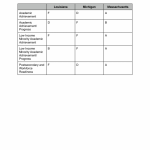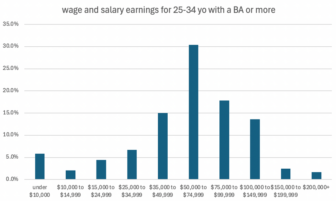Lots of new data on student achievement by Michigan k-12 students. All with a single conclusion: we are a national laggard. All kids, not just poor kids, minority kids, urban kids.
The results from the new state M-STEP assessment show Michigan students in reading––at all tested grade levels––to be about 50% proficient. In math its about one third proficient except for third and fourth graders who are around one half proficient.
M-STEP is Common Core aligned. Which is designed to prepare our children to use content, not just know content as has been the case with previous standardized tests. Clearly a better measure of both college and career ready.
The national NAEP test results were released the same week as the M-STEP results. NAEP is called the nation’s report card and provides apples-to-apples data for all states for 4th and 8th graders on rigorous reading and math tests. Michigan’s NAEP proficiency is even lower than M-STEP. 34% in 4th grade math, 29% in 8th grade math. In reading its 29% proficient in the 4th grade and 32% in the 8th. On each of the four tests proficiency was lower in 2015 than 2013. Not good!
On all four tests Michigan is below the national average. Ranking 41st in 4th grade reading, 31st in 8th grade reading, 42nd in 4th grade math and 38th in 8th grade math. To take the excuse of the table that our poor performance is due to having more minority and/or low income students than high ranking states here is how Michigan’s higher income students rank: 48th in 4th grade reading, 33rd in 8th grade reading, 45th in 4th grade math and 41st in 8th grade math.
Matthew Chingos in an Urban Institute report entitled Breaking the Curve calculates state performance on the 2013 NAEP if each state had identical student demographics. Michigan ranks 44th in both performance in 2013 and in change in performance from 2003-2013.
We have an all kids problem!
For those who think charter schools are the answer, think again. Michigan charter schools are laggards. The U.S. Department of Education just denied Michigan a $45 million grant to boost and expand charter schools. One of the reasons the Detroit Free Press reports:
The reviewers weren’t just critical of the lack of authorizer oversight. They also scored the state low for the academic performance of charters, awarding 15 out of 30 points in that area. One of the reviewers said the percentage of charters ranked in the bottom 5% of schools in the state “is unreasonably high.” Another questioned why, after two decades of charters, “student outcomes are still just ‘comparable’ to traditional public schools.”
This data just confirms and updates what we have known for years. Michigan’s k-12 student achievement is unacceptably low. Political and, even more so, business leadership have increasingly been telling us that talent is the asset that matters most to economic growth. And yet they have largely been missing in action when it comes to doing what is needed to improve student achievement for all kids.
When they have been engaged it has been largely to push an ideological agenda of unregulated choice. Which hasn’t worked
So what would an effective k-12 policy look like? As I wrote in a previous post:
Massachusetts has achieved the nation’s best student achievement through:
- setting rigorous standards for all kids and not lowering those standards when kids had trouble meeting them
- testing aligned with those rigorous standards
- developing teachers prepared to teach all kids the standards
- state funding that provides more resources for poor kids
- a limited number of charters that must meet rigorous quality standards to be able to operate (open, stay open and replicate) in the state.
Michigan, of course has gone in a completely different direction. We have been ambiguous at best about rigorous standards and aligned tests. Have not invested in developing educators to teach rigorous standards. Moved away from preferential state funding for low income students. Instead we have relied on parental choice as the prime lever to drive student achievement. Culminating in the elimination of the cap on charters without any quality standards.
The bottom line: the Massachusetts approach has worked, Michigan’s hasn’t. Seems like its time for Michigan to learn from the state with the highest student achievement in the country.
So what would an effective k-12 policy look like? As I wrote in a previous post:
So Massachusetts has achieved the nation’s best student achievement through:
- setting rigorous standards for all kids and not lowering those standards when kids had trouble meeting them
- testing aligned with those rigorous standards
- developing teachers prepared to teach all kids the standards
- state funding that provides more resources for poor kids
- a limited number of charters that must meet rigorous quality standards to be able to operate (open, stay open and replicate) in the state.
Michigan, of course has gone in a completely different direction. We have been ambiguous at best about rigorous standards and aligned tests. Have not invested in developing educators to teach rigorous standards. Moved away from preferential state funding for low income students. Instead we have relied on parental choice as the prime lever to drive student achievement. Culminating in the elimination of the cap on charters without any quality standards.
The bottom line: the Massachusetts approach has worked, Michigan’s hasn’t. The United States Chamber of Commerce Foundation Leaders & Laggards: A State-by-State Report Card on Educational Effectiveness gives Michigan an overall grade of D. For academic achievement a D and for academic achievement low income/minority an F. Maybe more concerning, the report gives Michigan an F in both categories for progress since 2007.
Massachusetts received an overall grade of A. For academic achievement an A and for academic achievement low income/minority an A. In terms of progress since 2007 the report gives Massachusetts a B for academic achievement and an A for academic achievement low income/minority.
Seems like its time for Michigan … to learn from the state with the highest student achievement in the country.
Other Michigan Future articles you may be interested in
– See more at: https://www.michiganfuture.org/04/2015/more-wrong-direction-k-12-policy/#sthash.xMTntOzO.dpuf
So what would an effective k-12 policy look like? As I wrote in a previous post:
So Massachusetts has achieved the nation’s best student achievement through:
- setting rigorous standards for all kids and not lowering those standards when kids had trouble meeting them
- testing aligned with those rigorous standards
- developing teachers prepared to teach all kids the standards
- state funding that provides more resources for poor kids
- a limited number of charters that must meet rigorous quality standards to be able to operate (open, stay open and replicate) in the state.
Michigan, of course has gone in a completely different direction. We have been ambiguous at best about rigorous standards and aligned tests. Have not invested in developing educators to teach rigorous standards. Moved away from preferential state funding for low income students. Instead we have relied on parental choice as the prime lever to drive student achievement. Culminating in the elimination of the cap on charters without any quality standards.
The bottom line: the Massachusetts approach has worked, Michigan’s hasn’t. The United States Chamber of Commerce Foundation Leaders & Laggards: A State-by-State Report Card on Educational Effectiveness gives Michigan an overall grade of D. For academic achievement a D and for academic achievement low income/minority an F. Maybe more concerning, the report gives Michigan an F in both categories for progress since 2007.
Massachusetts received an overall grade of A. For academic achievement an A and for academic achievement low income/minority an A. In terms of progress since 2007 the report gives Massachusetts a B for academic achievement and an A for academic achievement low income/minority.
Seems like its time for Michigan … to learn from the state with the highest student achievement in the country.
Other Michigan Future articles you may be interested in
Leave a Comment
– See more at: https://www.michiganfuture.org/04/2015/more-wrong-direction-k-12-policy/#sthash.xMTntOzO.dpuf












